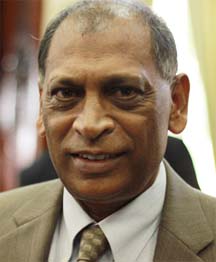Failure to meet strict sanitary and phyto-sanitary conditions have hindered the aquaculture export trade to countries within the region (like Trinidad and Tobago), which have huge import bills for aquaculture products.
This was revealed on Wednesday last when the Minister of Agriculture, Dr Leslie Ramsammy met with farmers involved in aquaculture at the Guyana School of Agriculture (GSA), Mon Repos, to discuss recommendations to develop a high yielding aquaculture industry to enter the Caribbean, North America and European markets.

In a release from the Government Information Agency (GINA), the minister was quoted as saying, “When I investigated why Trinidad would import from China, one of the reasons cited is that Guyana does not meet the sanitary and phyto-sanitary standards that are necessary for entry of food products into Trinidad. Barbados and Jamaica have said the same, for that reason I am about to send a team to Trinidad to look at these sanitary and phyto-sanitary standards, and also to work with you [farmers] so that we know what these standards are and we meet these standards.”
He highlighted the fact that Belize with only about eight acres of aquaculture ponds producing tilapia, being able to exceed the exports of any other Caribbean country to the US and Europe because Belize has developed all of the necessary sanitary and phyto-sanitary standards to export to those markets.
According to GINA, Ramsammy explained that in seeking to enter export markets Guyana must first meet the non-tariff and sanitary standards for export trade to these countries.
GINA said the Ministry of Agriculture is seeking to develop the necessary framework to increase participation in the growing trade for aquaculture products. To ensure that Guyana adheres to the international guidelines for export of aquaculture products, the Ministry of Agriculture will soon implement a number of regulatory measures.
The minister disclosed that they are about to approve the national policy for inland fishing and aquaculture and at present are finalising the fishery product regulations; the marine fishing regulations and the aquaculture regulations.
The farmers also discussed the constraints to increasing production for export. They cited the lack of availability of nutritious local fish food, limited supply of USAID fish food, the lack of land for expansion, difficulty in accessing loans and financing and not enough government support.
In response, Ramsammy acknowledged the need for local feed of quality and said that ministry is seeking to address this through research and development of an indigenous fish food, the release said.
GINA said that the issue of financing remains a problem and the minister said that while government has and will continue to give support to the farmers through research or the provision of equipment, the onus is on the farmers to seek to invest in the development of their aquaculture enterprises.
During the meeting it was decided that a15-man National Oversight Committee would be established to accelerate the expansion of the industry, with the goal of ensuring Guyana becomes a major aquaculture exporter. The committee which will be established by the end of April will comprise ministry officials and farmers who attended Wednesday’s meeting.
One farmer also suggested setting up an aquaculture park.
The farmers were informed that an investor is seeking to work with the ministry on the concept of an aquaculture park and that it will seek to build this park around the Satyadeow Sawh Research Centre, GINA added.





